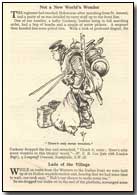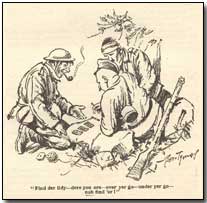Memoirs & Diaries - The Best 500 Cockney War Stories - Lads of the Village and Other Stories
 Published in London
in 1921, The Best 500 Cockney War Stories
comprised, in the words of its newspaper publisher (The London Evening
News) "a remembering and retelling of those war days when laughter
sometimes saved men's reason".
Published in London
in 1921, The Best 500 Cockney War Stories
comprised, in the words of its newspaper publisher (The London Evening
News) "a remembering and retelling of those war days when laughter
sometimes saved men's reason".
The collection of short memoirs, some 500 in total, is divided into five categories - Action, Lull, Hospital, High Seas and Here and There. This page contains four stories from Lull, led by Lads of the Village.
Other sections within the collection can be accessed using the sidebar to the right.
Lads of the Village
While en route from the Western to the Italian front we were held up at an Italian wayside station and, hearing that we had some time to wait, our cook says, "Nah's our chance to make some tea."
So we dragged our boiler on to the end of the platform, scrounged some wood, and soon had the fire going and the water on the boil.
"Nah we will get the tea and sugar," says the cook. When we returned we found that the chimney of the boiler had disappeared, smoke and flames were roaring up, and the water was ruined by soot.
An Italian soldier was standing by, looking on. "Somebody's pinched our chimbley," gasped the cook, "and I've got an idea that this Italian fellow knows somefing abaht it."
Back came the reply from the Italian, in pure Cockney: " I ain't pinched yer chimbley, mate!"
"What! yer speak our lingo?" says the cook. "What part of the Village do yer come from?"
"Clerkenwell," was the reply.
"Give us yer mitt," says the cook. "I'm from the same parish. And nah I knows that yer couldn't 'ave pinched our chimbley. It must have been one of them scrounging Cockneys."
H. Howard, 26 Hanover Street, Islington, N1
Before 1914, When Men Worked
Night after night, for three weeks, with never a night off, we took ammunition up for the guns at Ypres in 1917. Sometimes we couldn't get back until 5 a.m. or 6 a.m. - and the day was spent feeding and grooming the horses, cleaning harness, and a hundred odd jobs besides.
We had built a bit of a shack, and in this I was writing a letter home, and one of my drivers noticed my handwriting on the envelope.
"Coo, Corp! You can't 'arf write! 'Ow did yer learn it?" he said. I told him I had been in an insurance office before I joined up. "Lumme!" he exclaimed, "did yer work once, Corp?"
David Phillips (late R.F.A.), The Ship Inn, Soham, near Ely, Cambridgeshire
Their Fatigue
In August 1915, our Division was moved to the Loos area in preparation for the battle which began on September 25, and I well remember the long march which brought us to our destination - the mining village of Noeux-les-Mines, about a mile from Mazingarbe.
We ended the hard and tiring journey at a spot where a huge slag-heap towered above our heads to a height of seventy or eighty feet. On our arrival here there were the usual fatigue parties to parade, and with everyone tired and weary this was an unthankful duty.
The youngest Cockney in my section, who was always cheerful, hearing me detailing men for fatigue, shouted out, "Come on, mites; paride with spoons and mess-tins. The blinking fattygue party will shift this perishin' slag-heap from 'ere to Mazingarbe."
Herbert W. Bassett (Cpl. attached 47th London Division), 41 Argyle Road, Sevenoaks, Kent
Teaching Bulgars the Three-card Trick
At Butkova, on the right of Lake Doiran, in 1917, we had surprised the Bulgar and had pushed forward as far as the foot of the Belashitsa Mountains, the reserve position of the enemy.
After a sharp encounter we retired, according to plan, and on the return to our lines we heard murmurings in a nullah to our right.
Motioning to me and the section corporal, our platoon commander advanced cautiously towards the nullah and you can imagine our surprise when we discovered "Dido" Plumpton calmly showing the "three-card trick" to the two Bulgar prisoners he had been detailed to escort.
He was telling his mystified audience: "Find der lidy - dere you are - over yer go - under yer go - nah find 'er!"
Alfred Tall (late 2nd East Kents), 204 Hoxton Street, N.1
Next - Hospital section
A "creeping barrage" is an artillery bombardment in which a 'curtain' of artillery fire moves toward the enemy ahead of the advancing troops and at the same speed as the troops.
- Did you know?

